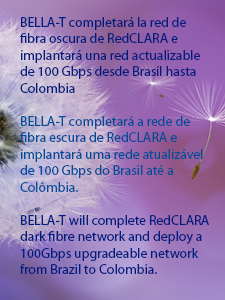The Cloud Provisioning and Service-sharing Groupware Standards is the task of Work Package 3 (WP3) which is lead by RedCLARA.
WP3 Participants are: GÉANT, RENATA, RNP, REUNA, CEDIA, CUDI, RENATER, GRNET, CESNET, CKLN, UbuntuNet Alliance, WACREN, ASREN, TEIN*CC, NITC, NIIFI, CSIR, SURFnet.
WP3 Objectives:
- To develop a model for inter-operation between NREN cloud application markets of participating world regions, based on cloud provisioning and taking advantage of applications developed and run by NRENs across different continents to create a model for a worldwide application market for collaboration tools and services.
- To choose or define the standards in order to make groups management systems interoperable across different federated environments, extending federations integration to facilitate authorisation, user interaction, and global group administration.
- To establish a set of standard requirements for cloud providers to increase security, quality, interoperability and privacy over shared resources and services in the NREN clouds.
Description of work:
Several NRENs in the world are working on cloud strategies that provide a secure market of services for their end users. Examples include SURFmarket, the CHAIN-REDS science gateways, and the ELCIRA project in Latin America. Most NRENs are focused on needs that commercial providers cannot fulfill, including privacy, academic specific services and direct NREN support. In this work package, the MAGIC group aims to generate a set of inter-operation agreements for a federated system of group management that will serve as a basis for collaboration application-sharing among the NRENs of the World. NRENs will have applications deployed on a continent working with the same group in other parts of the world. Applications will be group/community-aware and will be able to adapt to customers’ needs. Research and education communities will be able to schedule, authorise, share, or carry out actions for specific groups or communities, even if they are located on another continent.
In this task, the focus will be on coordinating a global set of core requirements which cloud service providers are expected to meet, covering the following fields: intellectual property rights and ownership, legal aspects, security, continuity, confidentiality, communication, billing and technical requirements. This work will enhance and facilitate integration between NRENs while maintaining a high standard of service and security.
Activities:
3.1 Agreements for a standard in federated group management (FGM Standard) and Application Programming Interfaces (API) for it.
3.2 Definition of a set of applications that will adopt the FGM Standard.
3.3 Recommendations for Service Definitions from a marketing point of view.
3.4 Pilot portals for Latin America and other regions as appropriate, incorporating the FGM Standard.
3.5 Definition of a standard for interoperability of cloud provisioning.
3.6 Pilot of Federated service provisioning between the regions in 3.4.
3.7 Deployment of a pilot Federated Cloud Service (FCS) model, for a set of NRENs in LA, Europe, Africa, etc.
3.8 Evaluation of the FCS by the user NRENs.
3.9 Refinement of the FCS using the feedback obtained from NRENs.























